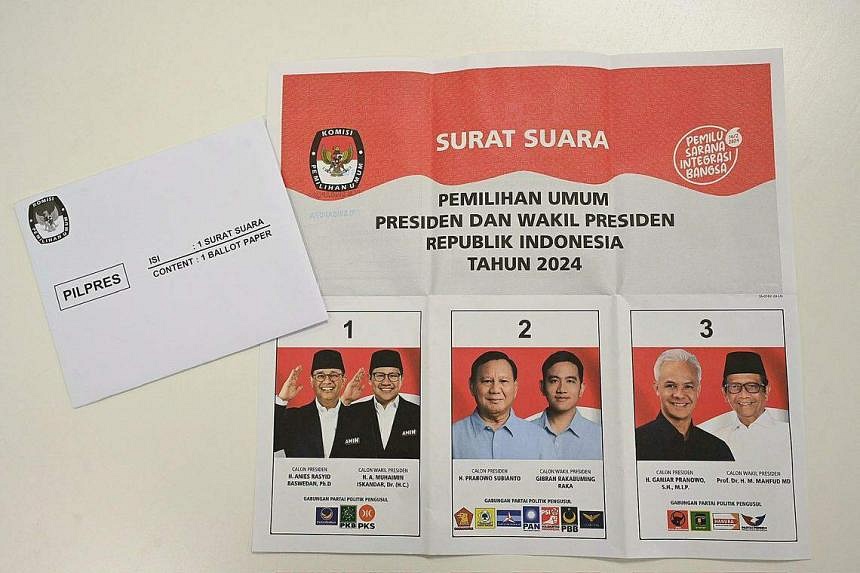JAKARTA – About 205 million Indonesians will head to the polls on Feb 14 to choose the country’s next president and vice-president.
Here’s what you need to know ahead of polling day in the world’s fourth-most populous nation:
Q: What is being decided in Indonesia on Feb 14?
A: In what has been called the world’s biggest election to be held in a day, millions of Indonesians will vote for their next president and vice-president.
Besides the presidential vote, the national parliamentary election will also take place on the same day, with the electorate choosing their executive and legislative representatives at all administrative levels across the nation.
About 205 million of Indonesia’s more than 270 million people are eligible to vote. And with just over half – or 106.4 million of the eligible voters – aged 17 to 40, the youth vote will play a significant role in this election.
Much attention has focused on the presidential race, as the country’s current leader, Mr Joko Widodo, popularly known as Jokowi, is finishing his second five-year term and is constitutionally barred from contesting again.
Q: Who is in the running?
A: Three pairs of candidates are vying for president and vice-president.
The first pair consists of current front runner Prabowo Subianto, 72, the defence chief, who narrowly lost to Mr Widodo in 2014 and 2019, and Solo mayor Gibran Rakabuming Raka, 36, Mr Widodo’s eldest son.
A controversial figure, Mr Prabowo has managed to sidestep past allegations of human rights abuses when he was special forces commander in the country’s armed forces over 20 years ago, and recent controversies surrounding his choice of running mate for the vice-presidency.
Former governor of Jakarta Anies Baswedan, 54, who has also set his sights on the presidency, is running with former minister of manpower and transmigration Muhaimin Iskandar, 57, as vice-president.
Mr Anies, a former academic, is remembered by many for his adept handling of the situation in the capital during the Covid-19 pandemic, but some have criticised him for previously accepting the endorsement of hardline Islamist groups.
The third pair comprises ruling Indonesian Democratic Party of Struggle candidate and former Central Java governor Ganjar Pranowo, 55, and his running mate, Chief Security Minister Mahfud MD, 66.
Mr Ganjar, who has had a long career in public service, spent nearly a decade in the Indonesian House of Representatives before serving as governor for two terms.
Q: How will a winner be decided?
A: Indonesian law states that a presidential candidate needs a simple majority – or more than 50 per cent – of the votes to win. They also need to attain 20 per cent of the votes in half of Indonesia’s 38 provinces.
If that does not happen, the top two candidates will enter a run-off vote in June, with the third pair eliminated.
Surveys in recent months indicate that none of the candidates is set to exceed the required minimum of half the votes, with the Prabowo-Gibran pair hovering around the mid-40 per cent mark.
The next president will take office in October 2024.
Q: What have been the crucial issues during the campaigning period?
A: Dynastic politics has dominated headlines about the elections so far, with some accusing Mr Widodo of trying to continue his influence in the country with his son’s presence in the race.
Mr Gibran has been in the spotlight since Indonesia’s Constitutional Court issued a special ruling in October 2023 that effectively allowed him to run for the vice-presidency, despite him being younger than 40, the minimum age required to contest the election.
The court, chaired by Mr Widodo’s brother-in-law at the time, ruled that the age requirement would not apply to anyone who has held or currently holds a position won through a general election. Mr Gibran qualifies due to his position as mayor of Solo.
He has also attracted criticism for his behaviour during official debates, which some have called disrespectful, and for alleged campaign violations.
The upcoming move of the country’s capital from Jakarta to the new Nusantara city in East Kalimantan has also been an election issue that candidates have sparred over.
Mr Ganjar and Mr Prabowo have pledged to largely continue Mr Widodo’s development programmes, including setting up Nusantara in Kalimantan.
But Mr Anies has shot down the idea, saying this will create “new inequality” among the different regions. He has called for development not just in one location but also in other places.

Q: How is the election important to Singapore and the region?
A: Indonesia is Singapore’s neighbour, and both countries have substantive cooperation across a wide range of sectors, including education, culture, defence and the environment.
In 2022, Indonesia was Singapore’s top source of visitors, with some 1.1 million people – accounting for 17.4 per cent of total visitor arrivals – from the archipelago.
Singapore has been Indonesia’s top foreign investor since 2014, with total investments reaching $17.5 billion in 2022.
That year, Singapore was Indonesia’s fourth-largest trading partner, and Indonesia was Singapore’s sixth-largest trading partner, with bilateral trade reaching $74.6 billion.
In Asean, Indonesia is the largest nation and also has the biggest economy.
In the realm of digital economy, Indonesia was the biggest online spender in South-east Asia in 2022, accounting for 52 per cent of the region’s total gross merchandise value (GMV), according to a report by Singapore-based venture firm Momentum Works.
Geopolitically, Indonesia has also increasingly become a big player.
In 2022, besides staging the first meeting between US President Joe Biden and his Chinese counterpart Xi Jinping, Indonesia also led the Group of 20 (G-20) nations during the Covid-19 pandemic.
In 2023, Indonesia chaired Asean and navigated the bloc through three conflicts: the Russia-Ukraine war, the Israel-Hamas conflict, and the civil war in Myanmar.


